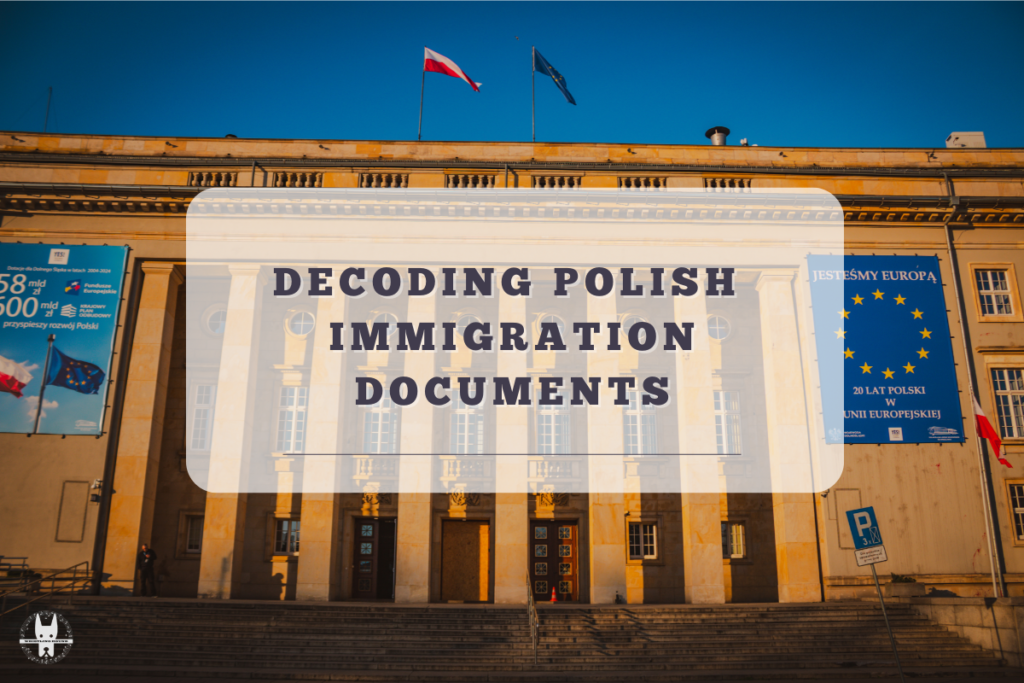You open a letter from the Urząd Wojewódzki, and your heart sinks. Is it a rejection or a simple request?
Polish bureaucracy for expats can feel daunting, but this detailed guide makes it clear. From wnioski to wezwania and karta pobytu applications, we decode the terms to help you live, work, or start a business in Poland. It is tricky, but it’s also not impossible. If you’re planning to live in Poland, the trickiest part isn’t the paperwork; it’s the language that comes with it. A single letter from a government office can cause instant anxiety if you’re not sure whether it’s a routine request or a red flag.
This blog is your no-fluff decoder. It translates legalese into clarity. By the end, Polish bureaucracy for expats will feel a little less mysterious and a lot more manageable. Whether you’re registering a company, applying for a residence permit, or responding to a summons from the Urząd Wojewódzki, this guide unpacks what these documents mean, how to respond, and what to watch for.
Why Understanding Bureaucratic Polish Is Crucial for Expats and Entrepreneurs?
For expats and entrepreneurs, mastering Polish bureaucracy for expats is the key to turning Poland into a home. Applications (wnioski), declarations (oświadczenia), summons (wezwania), and decisions (decyzje) are standard, but it’s their tone, context, and implications that define your next steps.
Understanding what each Polish legal document demands isn’t just helpful, it’s strategic. Let’s dig in.
Mastering the Wniosek: Your Key to Polish Applications
Simply put, Wniosek is the ‘Application’ you’ll fill out more than once.
A wniosek is the cornerstone of Polish bureaucracy for expats. It’s the formal application for a Polish residence permit (karta pobytu), work permit, or business registration. Each requires annexes (załączniki), like a rental agreement (umowa najmu) or job contract, to prove stability.
Filing a wniosek isn’t just about ticking boxes. It means attaching the right annexes (załączniki), stating your purpose clearly (cel pobytu), and preparing documents like rental agreements or job contracts that prove your intent and reliability.
Wniosek is used when applying for:
- A temporary residence permit (karta pobytu czasowego)
- A work permit (zezwolenie na pracę)
- Business registration (działalność gospodarcza)
- Tax identification (NIP) or PESEL
- Public health insurance (NFZ)
Check the wniosek checklist on mos.cudzoziemcy.gov.pl. Missing an umowa najmu (rental agreement) can trigger a wezwanie. Unsure? SG Adwokaci can review your karta pobytu application.
Wezwanie Decoded: How to Respond to a Polish Immigration Summons
Wezwanie is when the immigration office wants “more” from you!
A wezwanie is a summons, a formal letter from the government asking you to clarify, correct, or complete something in your application. It’s usually time-bound, often 7 days, and failing to respond could put your case on hold or lead to a karta pobytu rejection.
Common reasons for a wezwanie:
- Missing a job contract from your employer
- Incomplete rental agreement
- Mismatched dates on your oświadczenie and wniosek
- Missing umowa najmu (rental agreement)
A wezwanie do uzupełnienia braków formalnych is your chance to fix issues in your karta pobytu application. Respond within the deadline (often 7 days) with requested documents, like an umowa najmu. Missed the deadline? File a prośba o przywrócenie terminu (request for deadline reinstatement).
What’s an Oświadczenie? Your Declaration, Their Decision
Oświadczenie, the statement of truth, is your personal or employer declaration, critical for the Polish immigration process. Oświadczenie is often required to prove employment, intent to stay, housing, or business status.
Examples include:
- Oświadczenie o zapewnieniu lokalu: declaration by your landlord confirming accommodation
- Oświadczenie o powierzeniu pracy: employer’s statement of intent to hire a foreigner
The tone and content must be consistent. Any mismatched info in oświadczenia, especially regarding income, job details, or address, can be flagged during verification.
Karta Pobytu: Your Path to Legal Residency in Poland
The holy grail for most expats: the karta pobytu. Officially, it’s your residence card in Poland, and comes in four types:
- Pobyt czasowy: Temporary stay
- Pobyt stały: Permanent stay
- Rezydent długoterminowy UE: EU long-term resident status
- Niebieska Karta (Blue Card): For high-skilled non-EU workers.
The Niebieska Karta requires a high-salary job offer and an umowa o pracę.
To apply for karta pobytu, you’ll deal with:
- Wniosek o udzielenie zezwolenia na pobyt czasowy: Application for temporary stay
- Załącznik nr 1: Employer form for work-based applications
- Załącznik nr 2: University certificate for student-based applications
Remember, every detail matters. Even small typos in documents can trigger delays, especially for non-EU applicants.
Must read: How to Get a Temporary Residence Card (Karta Pobytu) in Poland – A Foreigner’s Step-by-Step Guide
Work Permits and Employment Contracts in Poland
There are three types of work agreements in Poland:
- Umowa o pracę: Employment contract (most secure)
- Umowa zlecenie: Civil contract
- Umowa o dzieło: Task-specific contract
If on a Schengen visa, confirm it allows work before applying for a Polish work permit. Short-term Schengen visas often restrict employment. If you’re a non-EU citizen, your employer might also need to secure a:
- Zezwolenie na pracę: Work permit
- Or use the procedura uproszczona (simplified hiring procedure)
via the local Urząd Pracy (Employment Office). This often involves submitting an oświadczenie o powierzeniu pracy cudzoziemcowi (declaration of employment) to the local labour office.
Starting a Business in Poland: CEIDG, REGON, and NIP Explained
If you’re wondering how to register a sole proprietorship (działalność gospodarcza) as a foreigner in Poland, here’s your starter pack:
- CEIDG: Central Registration and Information on Business
- REGON: Statistical identification number
- NIP: Tax number
- PKD: Code for business activity type
Each has its place in registration. Missing or mismatched info, especially in your CEIDG form, can lead to problems with your residence application, so it pays to be precise.
Navigating Polish bureaucracy for expats also involves:
- ZUS: Register for social insurance via deklaracja ZUS. Mandatory for health/pension contributions.
- VAT: Register if your business exceeds 200,000 PLN annually. VAT-EU applies to cross-border trade.
- KRS: For LLCs (spółka z o.o.), use eKRS for online registration.
- PIT: File PIT-36 or PIT-36L for personal income tax. Ensure CEIDG aligns with your Polish residence permit.
Family and Marriage-Based Residency in Poland: Key Terms to Know
If you’re married to a Polish citizen, your Polish residence permit path involves:
- Zezwolenie na pobyt czasowy w celu połączenia z rodziną: Temporary residence for family reunification
- Zaświadczenie o zawarciu związku małżeńskiego: Marriage certificate often needing an apostille or legalization.
- PESEL: National identification number (you’ll need it for almost everything)
- Umowa najmu: Rental agreement proving shared housing.
Even if you’re married, you’ll need to prove cohabitation, shared finances, and relationship stability. The process is thorough.
Document Legalisation and Language Requirements
Navigating Polish bureaucracy for expats often involves legalising documents:
- Apostille: For Hague Convention countries (e.g., marriage certificates).
- Legalisation: For non-Hague countries, via Polish embassies. Most wnioski require Polish or certified translations (tłumacz przysięgły)
Handling Rejections and Deportation Risks in Poland
Some letters will stop your heart for a second. Here’s what they mean:
- Decyzja odmowna: Rejection decision
- Obowiązek opuszczenia terytorium RP: Order to leave Poland
- Postępowanie administracyjne: Administrative proceedings
- Termin do odwołania: Deadline to appeal
- Zobowiązanie cudzoziemca do powrotu: Obligation of a foreigner to return
Don’t panic if one of these lands in your inbox. But do act quickly. Hiring a legal rep who understands the case and language can make all the difference. The odwołanie (appeal) process requires a letter to the Urząd do Spraw Cudzoziemców within 14–30 days, addressing the rejection reasons. A qualified immigration lawyer can often help reverse or delay decisions. Get in touch with the professional immigration lawyers at SG Adwokaci for the most reliable help.
Navigating Polish Immigration Portals: MOS, ePUAP, Obywatel.gov.pl, and Profil Zaufany
Navigating these online portals feels like a 2005-era experience. Still, you’ll need it.
- mos.cudzoziemcy.gov.pl: For submitting residence applications and tracking status
- obywatel.gov.pl: Official portal for a wide range of citizen and resident services
- ePUAP: Electronic Platform for Public Administration Services, used for digital correspondence
- eKRS: Online company registration for KRS filings
Pro tip: Set up your Profil Zaufany (Trusted Profile) to sign forms and verify your identity online. SG Adwokaci can assist with navigating these portals.
Don’t Let the Polish Bureaucracy Intimidate You!
Understanding the system doesn’t mean loving it, but it helps you stay in control. Polish offices aren’t out to get you. But they are particular about documents, timelines, and the language you use to talk to them.
Whether you’re chasing your first karta pobytu or opening your dream cafe in Wrocław, decoding the bureaucratic Polish gives you more than a head start; it keeps you in the race. And I am here to keep you updated!
NOTE: This article is written in partnership with SG Advocates, a law firm dedicated to helping expats and immigrants navigate life and law in Poland with clarity, care, and confidence. Mention this blog to unlock an additional discount while getting their legal support.
FAQs
1. What is the difference between “wezwanie” and “decyzja odmowna”?
A wezwanie is a call to fix something missing or unclear. A decyzja odmowna is a final decision denying your application. One is a chance to act, the other is your cue to appeal.
2. Can I start a business in Poland while on a temporary stay?
Yes, under certain conditions. You need either a karta pobytu that allows business activity or a visa that explicitly mentions such permission. Always cross-check with your lawyer and CEIDG guidelines.
3. What happens if I miss the deadline in a wezwanie?
Missing a deadline in a wezwanie can lead to automatic rejection of your application. But if you have a strong reason, you can sometimes file a prośba o przywrócenie terminu(request for deadline reinstatement).
4. How do I know if my documents are enough for the wniosek?
Every wniosek comes with a checklist. Stick to it. If unsure, consult with a lawyer or review sample document lists from trusted government sites or firms like SG Advocates.
5. What is ZUS, and why do I need it?
ZUS is Poland’s social insurance system. Register to pay contributions for health and pension benefits, mandatory for employees and business owners.
6. How do I legalise foreign documents like a marriage certificate?
Use an apostille for Hague Convention countries or legalisation for others. Certified translations may be required. SG Adwokaci can guide you.
Further read: Think You’re Safe in Poland? 2025 Immigration Law Says Otherwise





